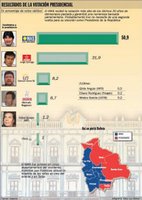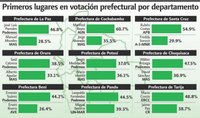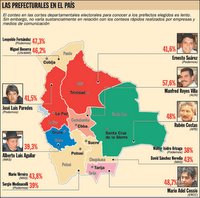Evo Morales, Presidente (Update 1)
Evo Morales has won the Bolivian elections with 50.9% of the vote, preliminary results show. Tuto Quiroga comes in second with 31,9% of the vote and a majority in the Senate. The great losers in this election have been UN, which only managed 8% of the vote and NFR, which got less than 1% of the votes after coming third (with just 0.3% less than MAS) just three years ago. MNR, on the hand, is the great survivor, with 6,7% of the vote, a Senator and 8 MPs (members of parliament). This is a great result for them considering that their last elected official (Gonzalo Sanchez) is an extremely hated figure.
Now, in the following picture, from Santa Cruz' daily El Deber we see the percentages obtained by all parties, but most interestingly, the East-West divide in the vote. In all blue regions, the winner was MAS and in all red regions, the winner was Podemos. Regional interests appear clear: The East, usually seen as a most progressive and richer region, has opted for Podemos over MAS. All the talk of nationalization and a strong state does not appear to fare well here. This, however, does not mean that MAS did not get a surprise second place in Santa Cruz, which signals that MAS' discourse better accepted in rural areas than previously thought. Further North, though, MAS did not repeat the success, as it was not even close to second in Pando and Beni.
In the West, MAS won its stronghold departments and managed to win departments that were thought to lean on Quiroga's favour, such as Potosi and Chuquisaca. Podemos, however, managed to get second places in all these regions, so that they get one senator for each Blue department.

All in all, the parliament is going to look as in the second picture, also from El Deber. The first interesting thing to notice is that Podemos, which is trailing by 20% in the general vote, has a majority in the Senate. This is due because Podemos either won or came second in all regions. MAS did not do as well in the North East, as previoulsy stated, so, no Senators for these regions. In the lower house, MAS do get half the congressmen and have a sizeable 20 MP difference with Podemos. Interestingly, even if we were to sum all centre-right parties, MAS is still the majority: Podemos (45) plus UN (10), MNR (8) and NFR (1) amount only 64 MPs. On the other side of the spectrum, MIP's only MP is probably going to be closer to MAS, giving the left a total of 66 MPs.

Now, to the third topic: prefects. According to a simulation done by Apoyo Opinion y Mercado, MAS has not won a single prefect, while Podemos has won 6 and different citizen groups the other 3 (the citizen group in Cochabamba is aligned with the now-extinct NFR and the one in Tarija with MNR), although MAS may still win in Potosi. This means that most of Morales' activities will be well chequed in the regions. Expect the prefects of Santa Cruz and Tarija to pose a great threat to MAS plans of hydrocarbon nationalization: the Santa Cruz prefect, from a citizen group called Autonomia Para Bolivia (Autonomy for Bolivia), will probably start pushing hard towards more departmental autonomy from the start. Mario Cossio should follow suit.

Update 1: It seems that Apoyo Opinion y Mercado has, once again, failed tremendously in its simulations. For a more accurate description of the prefect election, see the graph below, from El Deber. It seems that MAS is ahead in two regions -Potosi and Chuquisaca- and has won in a third one, Oruro. Also, the MAS candidate for the Tarija prefecture is disputing the result on grounds that, according to him, Mario Cossio has colluded with the CNE in order to 'depure' up to 70,000 voters, all of whom were his supporters (!).
The rest of the results are unchanged.

Bolivia
Now, in the following picture, from Santa Cruz' daily El Deber we see the percentages obtained by all parties, but most interestingly, the East-West divide in the vote. In all blue regions, the winner was MAS and in all red regions, the winner was Podemos. Regional interests appear clear: The East, usually seen as a most progressive and richer region, has opted for Podemos over MAS. All the talk of nationalization and a strong state does not appear to fare well here. This, however, does not mean that MAS did not get a surprise second place in Santa Cruz, which signals that MAS' discourse better accepted in rural areas than previously thought. Further North, though, MAS did not repeat the success, as it was not even close to second in Pando and Beni.
In the West, MAS won its stronghold departments and managed to win departments that were thought to lean on Quiroga's favour, such as Potosi and Chuquisaca. Podemos, however, managed to get second places in all these regions, so that they get one senator for each Blue department.

All in all, the parliament is going to look as in the second picture, also from El Deber. The first interesting thing to notice is that Podemos, which is trailing by 20% in the general vote, has a majority in the Senate. This is due because Podemos either won or came second in all regions. MAS did not do as well in the North East, as previoulsy stated, so, no Senators for these regions. In the lower house, MAS do get half the congressmen and have a sizeable 20 MP difference with Podemos. Interestingly, even if we were to sum all centre-right parties, MAS is still the majority: Podemos (45) plus UN (10), MNR (8) and NFR (1) amount only 64 MPs. On the other side of the spectrum, MIP's only MP is probably going to be closer to MAS, giving the left a total of 66 MPs.

Now, to the third topic: prefects. According to a simulation done by Apoyo Opinion y Mercado, MAS has not won a single prefect, while Podemos has won 6 and different citizen groups the other 3 (the citizen group in Cochabamba is aligned with the now-extinct NFR and the one in Tarija with MNR), although MAS may still win in Potosi. This means that most of Morales' activities will be well chequed in the regions. Expect the prefects of Santa Cruz and Tarija to pose a great threat to MAS plans of hydrocarbon nationalization: the Santa Cruz prefect, from a citizen group called Autonomia Para Bolivia (Autonomy for Bolivia), will probably start pushing hard towards more departmental autonomy from the start. Mario Cossio should follow suit.

Update 1: It seems that Apoyo Opinion y Mercado has, once again, failed tremendously in its simulations. For a more accurate description of the prefect election, see the graph below, from El Deber. It seems that MAS is ahead in two regions -Potosi and Chuquisaca- and has won in a third one, Oruro. Also, the MAS candidate for the Tarija prefecture is disputing the result on grounds that, according to him, Mario Cossio has colluded with the CNE in order to 'depure' up to 70,000 voters, all of whom were his supporters (!).
The rest of the results are unchanged.

Bolivia















4 Comments:
can someone please explain to me why Evo Morales keeps talking about the neo-liberals being the bad guys? I thought it was the neo-conservatives who were the problem. as if things were that simple,
but, if you have a thought on this I would appreciate hearing it
I am keeping a Bolivian record on my blog as well http://davidleewilson.blogspot.com/2005/12/bolivia-evo-morales.html
Hello-
my name is Robin Amer and I'm a producer with Open Source (www.radioopensource.org) a nationally syndicated public radio show hosted by Christopher Lydon, formerly of NPR's the Connection.
I'm writing you because we're doing a live hour of radio tomorrow night (Jan 3) at 7pm EST about Bolivia's recent elections, Latin America's left leaning governments, and the region's economic prospects and history. If you want to read more about this particular show you can do so here: http://www.radioopensource.org/latin-americas-new-socialism/.
The economist Jeffrey Sachs will be joining us for this show, but I'm hoping to have some other people on as well. I've been reading your blog and your report about the the elections, and I was hoping I could talk to you more, and explore having you on as a guest as well. If you are interested (and would be available during the 7-8pm EST hour tomorrow night) please let me know. I can be reached at the number below, or, feel free to send me an email with your number and a good time to talk.
Thanks so much. I look forward to speaking with you.
best,
Robin
Robin Amer
Producer
Open Source
617-497-8097
www.radioopensource.org
robin@radioopensource.org
i found a chart that showed 53.7% for evo - i don't speak spanish, maybe i missed the point?
http://davidleewilson.blogspot.com/2005/12/bolivia-evo-morales.html
Hi David and Robin
I am really sorry to write back to you just today. I did not read your posts until just now. I have had a paper accepted to a conference and been really busy preparing for it, presenting it, etc. so I haven't been blogging. In any case, I will resume activities in the next days.
I will look at the issues you presented me, and try to go back to you.
I am really sorry.
Post a Comment
<< Home